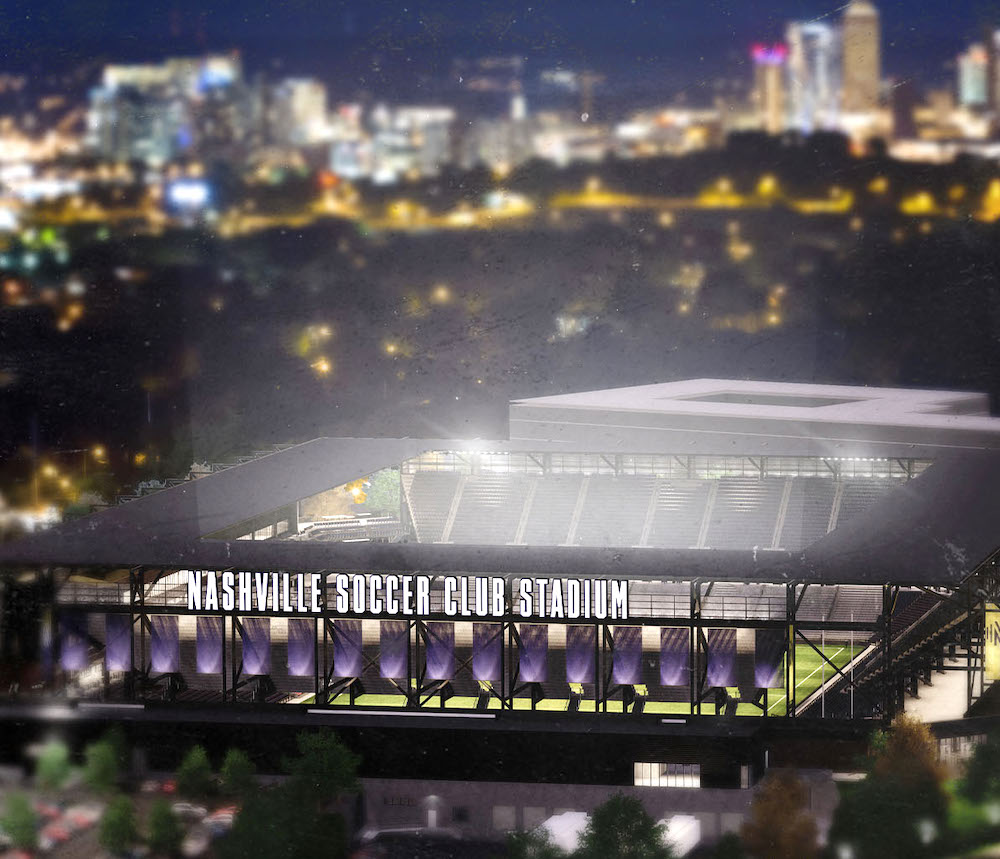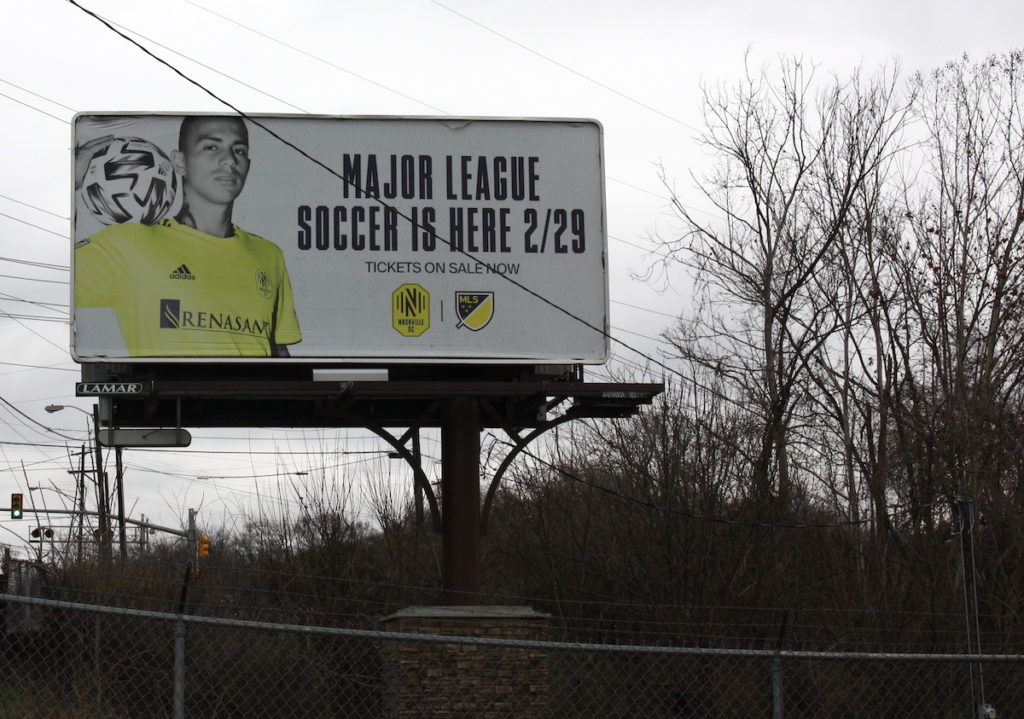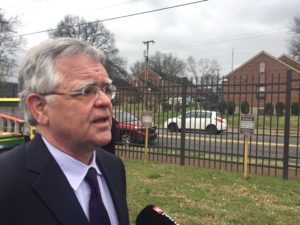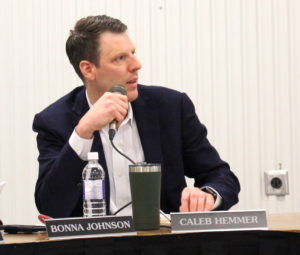
The deal negotiated by Nashville Mayor John Cooper and Nashville SC lead owner John Ingram shifts more of the stadium’s cost to the team and alters how a key piece of public property will be incorporated into the project.
Most immediately, the deal allows demolition to begin to clear old fairgrounds structures. But opponents say they’ll ask a court to halt that move.
The mayor and the team went public with their disagreements earlier this month. But Cooper said attorneys were able to finish agreements at about 10 p.m. Wednesday, and statements from the two sides were cheerful and united.
“We are very happy to be moving forward with the stadium construction” Ingram said.
“I’m so glad we’ve reached a better deal for Nashville,” Cooper said.
The mayor emphasized that the Nashville Soccer Holdings ownership group will pay $54 million more than in the initial deal.
Nashville SC will play its first Major League Soccer game Feb. 29 at Nissan Stadium. Plans call for that football facility to host the first two seasons.
Revisions Detailed
The mayor called the initial stadium plan “incomplete,” and said his intent was to make a better deal for taxpayers, to abide by the Metro Charter and to make sure all fairgrounds uses would be accommodated.
The revisions include:
- Nashville SC pays an extra $19 million for infrastructure
- The team takes over $35 million in lease payments
- The team agrees to an “open plaza” on what’s known as Parcel 8c, which has been expected to be the site of a mixed-use development
“I’m not going to say it’s going to be perfect,” he said, “but I am saying this is the best available deal to get this done, consistent with honoring Nashville’s commitment that was made by the council. We’ve taken that and improved it.”
 Tony Gonzalez WPLN
Tony Gonzalez WPLNA billboard over the Nashville Fairgrounds promotes the start of the Nashville SC season, which will take place at Nissan Stadium.
Most of the renegotiated terms were already public, with the biggest addition announced Thursday pertaining to Parcel 8c, which is land between the future stadium and the existing speedway.
The initial plan called for that land to be part of a mixed-used development, but that idea has drawn criticism.
The new deal paints a more complicated picture of what may end up there. It’s not clear whether the proposed plaza would cover all or part of the parcel.
Instead, the two sides have agreed to a “statement of principles” about the mixed-use work.
“Tying the Fairgrounds development together will be a network of open gathering spaces. … These flexible spaces will support and enhance the visual relationships between the major uses at the Fairgrounds.”
The statement outlines three such spaces, including “along and/or within Parcel 8c,” and states that the design of buildings around those spots will be “essential to their success.”
But whether a structure will rise on that land is unclear. A spokesman for the ownership group said the agreement “absolutely allows for a building still.” But the mayor’s spokesman said “the plan could involve reallocating some or all of the development on 8c to other parcels. The parties will engage in good faith discussions to make those decisions. We’re pleased that there will be open space linking the two venues.”
The mayor says he wants that land to be “the most interesting, best public space in Nashville.”
 Tony Gonzalez WPLN
Tony Gonzalez WPLNMayor John Cooper said he was glad to be done with a difficult negotiation so that he could next focus on the Metro budget.
“I have to make that extra effort to create the kind of public space — connecting to greenways — that we’re going to expect out of a well-designed city going forward,” Cooper said. “Every land planner I ever talked to looked at the plan and said there’s one part of this that doesn’t work.”
He said more open space will also be better for future speedway improvements, for the Tennessee State Fair, and for greenway connectivity.
Unknowns And Mixed Reactions
The project has divided residents, elected officials and civic groups largely because of how a soccer stadium will change the Nashville Fairgrounds. And as anticipated, Thursday’s announcement drew drastically opposing responses from the plan’s fans and detractors.
One official who oversees that property, Fair Board Commissioner Caleb Hemmer, pushed in recent days for construction to get going. Hemmer said demolition of old fairgrounds buildings will begin soon, and that bulldozers were already on a different part of the property for other recent work.
 Tony Gonzalez WPLN
Tony Gonzalez WPLNMetro Fair Board Commissioner Caleb Hemmer says the newly announced deal will serve soccer fans and other fairgrounds goers.
“We’re just thrilled after years of waiting on actual progress that things can finally begin,” he said.
Stadium opponents, meanwhile, are vowing to continue fighting, including through a lawsuit that‘s set for a trial this spring.
“While sick to my stomach and disappointed beyond measure, I understand the box Mayor Cooper has been painted into by the past administrations,” said Shane Smiley, with the Nashville Flea Market Vendors Association. “We will soldier on and fight this land grab that clearly violates the charter. … The uber-wealthy pushing the little guy out of the way so he may make billions more is not justice.”
The group Save Our Fairgrounds contends the city ignored the Metro Charter when approving the project. The charter includes special provisions to protect the longstanding uses of the fairgrounds.
A Nashville judge recently ruled largely in favor of Metro — saying a soccer stadium was an allowable use — but the judge also said that a trial is warranted on the question of whether the stadium would make it impossible to host the annual Tennessee State Fair on the property.
Jim Roberts, the attorney for Save Our Fairgrounds, told WPLN News on Thursday afternoon that he will try to get an injunction order to stop site work.
“Taking a horrible deal and turning it into a terrible deal doesn’t change the fact that it’s a bad deal for Nashville,” Roberts said.
Also yet to be determined: how the Tennessee State Fair will use the property for the annual event in September. That will be a key question at trial.
The fair’s manager, Scott Jones, said earlier this week that he’s optimistic the state fair can be conducted. But he is concerned about reduced parking, and says construction work in certain areas would cause a major disruption.
“If there are some things that are addressed,” Jones said, “that could definitely be fine for this year.”
Perhaps most unknown is the future of racing at the fairgrounds. There has not been a specific plan announced to bring NASCAR to the raceway that’s adjacent to the stadium site. The mayor said the company Speedway Motorsports is interested and that he will work to make that a reality.
“Two 30,000-seat stadiums, right across from each other, is an incredible opportunity. But you do have to get the land plan right,” Cooper said. “You want people to come back and really go: That’s one of the most beautiful civic spaces in the United States.”
This is a developing story.

